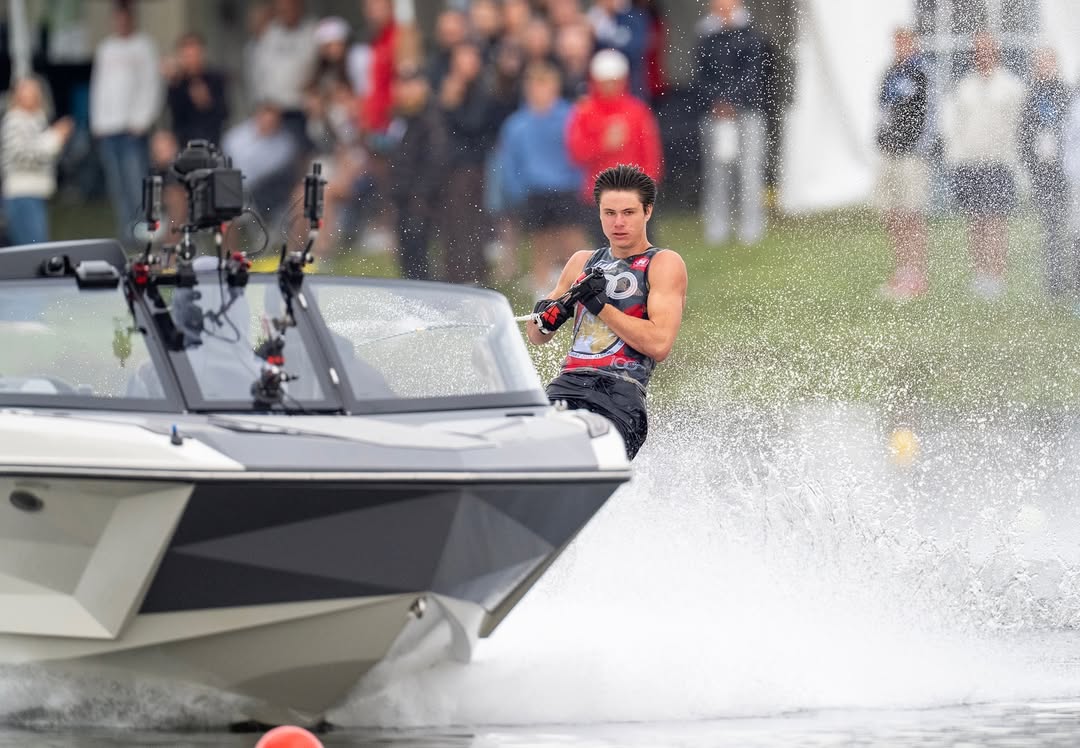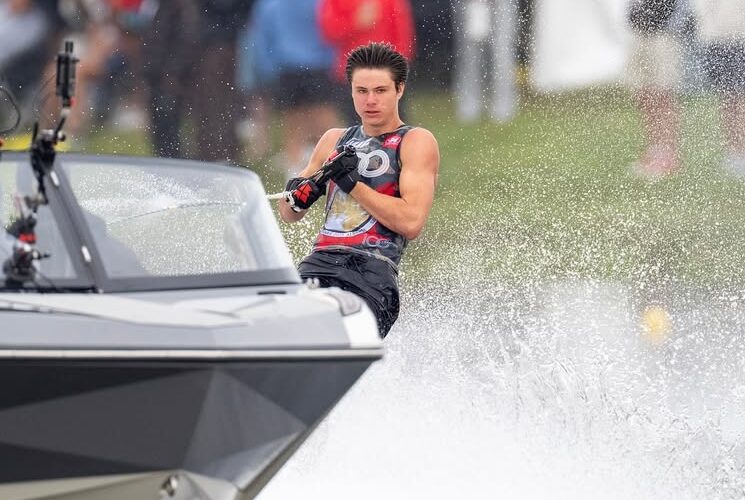Triumph, turmoil, and tears at the Under-21 World Championships in Calgary

Image: @johnnyhayward_photo
By Jack Burden
CALGARY, Alberta — The Under-21 World Waterski Championships have long served as the bridge between promise and prominence, a proving ground where rising stars and already-seasoned professionals collide. But even by its high standards, the 2025 edition—held at the picturesque Predator Bay Water Ski Club just outside Calgary—delivered a week of soaring highs, crushing lows, and a final day that left the waters of Alberta rippling with both celebration and controversy.
This was an event marked by breakout performances and premature heartbreak, where future world champions were minted and the sport’s deeper fissures were exposed for all to see.
Before the finals even began, the undercurrents of chaos were already pulling the field in unpredictable directions. In men’s tricks, a rash of early falls upended the leaderboard and torpedoed the hopes of several title contenders. Chile’s Matias Gonzalez, one of the pre-event favorites, fell early on his toe pass—then tried to mount a Patrice Martin-style resurrection. It wasn’t enough. His exit took with it any hopes of challenging Jake Abelson for the title.
By the end of qualifying, Team USA had built an insurmountable lead in the team standings, while Germany’s Tim Wild—still riding the momentum from his historic sweep at the Junior Masters—put the men’s overall title virtually out of reach before the final round even began.
With forecasts shifting, organizers moved the jump finals to the front of the schedule—and the drama began immediately.
The women’s event mirrored last year’s Under-17 showdown, held at the same site. Denmark’s Maise Jacobsen, the reigning U17 world champion, went over 48 meters to stake her claim early. Then came Australia’s Kristy Appleton, launching a huge 48.7-meter (160-foot) jump on her final attempt to take the lead.
But what followed was a string of brutal setbacks. Austria’s Leona Berner took a violent out-the-front on her opening jump—only to have competitors rally around her, offering skis and helping switch bindings in a stirring act of sportsmanship. Her teammate, Lili Steiner, another podium hopeful, landed awkwardly and was forced to withdraw injured. Canada’s Nellie Allard secured bronze after a new personal best, but it was Appleton who stood tallest, earning her first world jump title in stunning fashion.
The men’s final followed a similar arc. With several top seeds falling short of their qualifying marks, it was France’s Antoine Morin, skiing from the middle of the pack, who set the distance to beat: a clean, composed 60.6-meter leap—his first time ever clearing 60 meters.
Nobody else could match it. Wild locked in bronze to seal his overall title. Italy’s Florian Parth, returning to form after a quiet season, came closest but had to settle for silver. The top seed, American Gage Kacprowicz, dislocated his shoulder after crashing on his opening jump and was helped from the water. In the week’s most unexpected result, Antoine Morin became a world champion—despite not featuring on most pre-event radar screens.
In women’s slalom, South America, the continent that has claimed the last three Under-17 world titles, continued its rise. Skiers from Chile and Peru claimed the top four spots in the final, culminating in a dramatic three-way runoff between Christiana De Osma, Daniela Kretschmer, and Trinidad Espinal. The reigning Under-17 World Champion, De Osma, emerged victorious—running into 10.75m (39.5’ off) to seal the title.
The men’s slalom final was perhaps the most anticipated event of the tournament. But what was expected to be a shootout at 10.25m (41’ off) turned into a survival test, with skier after skier falling victim to the 10.75m line.
Mexico’s Jaime Palomino was the first to break through, posting 1.25 at 10.25m to set the pace. Australia’s Lucas Cornale looked confident through 10.75m but failed to get out of the gates on 10.25m. Then, reigning Under-17 World Champion Jaeden Eade pulled up narrow at 10.75m and fell short.
It was left to Canadian Charlie Ross, defending champion and home-country favorite, to finish the job. He didn’t disappoint. With measured aggression and trademark composure, Ross tied Will Asher’s 22-year-old World Championships record of 3@10.25m—matching the longest-standing mark in the sport’s history and becoming a two-time Under-21 World Slalom Champion.
The tournament ended with fireworks, and not just from the skiing.
Emma Davis of Team USA held a slim lead in the overall standings going into the trick final, with Alexia Abelson still within striking distance. But an off day in toes dashed Abelson’s chances in both tricks and overall.
Then came a trio of standout runs: Canada’s Hannah Stopnicki, Colombia’s Daniela Verswyvel, and Canada’s Olivia Chute all delivered strong performances. But when the scores dropped, controversy erupted.
Verswyvel’s reverse mobe—a pivotal 800-point trick—was unanimously ruled no-credit by the judging panel, dropping her to second behind Stopnicki. The TWBC live chat exploded with confusion and outrage. Elite skiers including Patricio Font and Neilly Ross voiced disbelief. Protests were lodged. Videos scrutinized. The call stood.
There’s an old adage in sport: the best judges are the ones you never notice. When they do their job well, the athletes—and not the adjudication—are the story. By that measure, the trick judging at this World Championships left much to be desired. This time, it was the judges, not the tricks, who stole the spotlight.
“I think that’s the discussion,” Gonzalez said on the TWBC broadcast. “In my opinion, it was pretty good—it is credit.”
What followed was a viral groundswell of support for Verswyvel, with her father sharing an emotional comment:
“After years of hard work and dedication, those who are supposed to be impartial lacked the humility to admit a mistake… Even if others refused to acknowledge it, the true champion proved it in the competition.”
But it’s worth stating clearly: Hannah Stopnicki is a phenomenal trick skier. She could easily have won with no drama had she landed her final flip. In a moment bigger than either athlete, Stopnicki and Verswyvel embraced after the final—two competitors in tears, caught in a storm they didn’t ask for.
“Honestly my toe run felt so good,” Stopnicki said. “I know the judges are looking at everything extra carefully today, so I was just trying to be as clean as I could be and stay on top of the water.”
In contrast, the men’s trick final was relatively sedate. With Mati Gonzalez relegated to the commentary box, only France’s Tristan Duplan-Fribourg looked like a potential challenger. The Frenchman earned plaudits with a gritty, chaotic, improvisational run that won over the crowd—but Jake Abelson was untouchable.
His 12,100-point performance set a new Under-21 World Championships record and added yet another accolade to what’s already one of the most decorated junior careers in water skiing history.
While the event featured standout performances across all disciplines, the shallow depth of the women’s field was a concerning undercurrent. The cutoffs to reach finals in slalom, tricks, and jump were among the lowest in tournament history—raising questions about development pipelines, participation, and long-term sustainability on the women’s side of elite water skiing.
But for one week in Calgary, the next generation took center stage—some rising, some falling, all reminding us why this sport, at its best, is one of the most beautiful and brutal in the world.


It was a fun to watch these young stars fight it out at what has to be one of the most beautiful sites I’ve ever seen. Kudos to TWBC for stellar camera work and for Tony who kept the commentary interesting over the long 4 days.